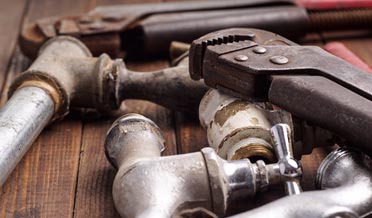How harmful drain cleaning chemicals can cause plumbing repairs
Don’t you just hate a clogged drain? Finding a smelly, unhealthy soup of water, food, and soap, or worse, human waste, and it won’t go away all by itself.
Using a plunger didn’t fix all plumbing repairs. Maybe it’s time to pour in some chemical drain cleaner. Before you do, consider these facts concerning chemical drain cleaners.
There are three basic types of drain cleaners.
- Acid-based cleaners use either sulfuric or hydrochloric.
- Alkaline-based cleaners use bleach or peroxide.
- Alkaline-based cleaners might also use lye or potash.
Generally, the cleaner is made heavier than the water portion of the clog to get to the base of the clog. The desired chemical reaction may create heat to melt away oils and grease.
Other drain cleaners attempt to dissolve the organic matter in the clog. However, if the heat is insufficient or the chemical is too diluted to dissolve, the clog remains and now a hazardous chemical remains in the pipes.
Plumbing repairs problems often develop between the chemical compounds and plumbing fixtures.
- The chemical can act as a corrosive agent to metal pipes and sealants that connect the pipes.
- If the chemical reaction creates enough heat, it can have an adverse effect on PVC and plastic pipes.
- All these chemicals can create noxious and dangerous fumes.
- While these chemicals can dissolve a mass of organic matter, they are also capable of dissolving the inner lining of drainpipes.
- All these chemicals are highly toxic and will kill natural bacteria in septic systems and at wastewater treatment plants. They are equally hazardous should they be released into the environment.
The greatest danger arises from further human activities. When the clog remains, further human activities are required, and this activity is often vigorous.
Should the acid or alkaline compound contact the skin or eyes, the corrosive effect can be quite damaging. That makes the smelly, unhealthy soup a toxic mixture as well.
The instructions for the containers indicate that anyone using the chemical use thick gloves to prevent burns to hands and skin. Experts recommend wearing a protective eye covering and a face mask for protection.
Storing drain cleaning chemicals should be done very carefully. The corrosive material may react with the exterior of the container, causing the material to leak and damage surrounding materials.
It must be stored out of the reach of children and pets! If ingested, the corrosive chemicals will cause serious damage to internal organs.
For stubborn clogs that are not released by a “plumber’s helper” or plunger, it is best to call a plumber, for several reasons.
- A plumber can locate the clog and determine the correct method of releasing it.
- A plumber has more options for clearing the clogs, including mechanical cleaners, powered “snake” cleaners, or high-pressure water jets.
- The clog may be a symptom of a larger problem. Only a plumber can determine the extent of the problem.
No matter the size of the Plumbing Repairs, Doctor Cool can help!
Let Doctor Cool help with your Plumbing Repairs question before buying your home. Call Doctor Cool & Professor Heat today at 281-338-8751 or email Doctor Cool and let our professional Residential Plumber Contractors assist with all of your plumbing repairs questions.

